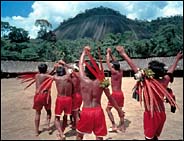Sunday, June 29, 2003
A Strong Yen Helps Tokyo Retain Status as Most Costly
Posted by click at 3:03 AM

TIMES NEWS TRACKER
A Strong Yen Helps Tokyo Retain Status as Most Costly
By JAMES BROOKE
TOKYO, June 16 <a href=www.nytimes.com>NYT— Defying notions about Japanese deflation, Tokyo is again the most expensive city in the world.
A 4 percent drop in the exchange value of the dollar against the Japanese yen helped keep Tokyo in first place and place Osaka third in an annual cost-of-living survey of 144 major world cities conducted in March by Mercer Human Resources Consulting of Geneva, a Marsh & McLennan company.
With cab fares starting at $5, $10,000-a-month rents for apartments not uncommon and intercity rail travel expensive, Tokyo residents notice the 1 percent annual deflation rate of prices in yen.
"Even though Japan is facing a deflationary situation, the yen appreciated against the dollar, which made the cost of living go up," Yvonne Traber, director of the survey, said from Geneva, which jumped to 6th place this year from 28th in 2002.
Last year, no European city was more costly than New York, which ranked in seventh place. But this year, with New York 10th, four European cities were more expensive — London, Zurich, Geneva and Moscow.
For Americans planning to travel abroad this summer, a drop in the dollar against the euro of around 20 percent has made European destinations significantly more expensive.
Oslo rose to 13th place from 40th last year; Copenhagen to 15th from 62nd; Milan to 17th place from 63rd; and Paris to 23rd from 74th.
"Italy went up drastically, and that really reflects the euro," Ms. Traber said. For the same reason, she noted, Dublin jumped to 21st place, from 73rd.
Of the nine cities more expensive than New York in the new rankings, five were Asian: besides Tokyo and Osaka, they were Hong Kong (4), Beijing (5) and Seoul (8).
Moscow, which has an extremely expensive housing market for foreigners, was the world's second most expensive city, unchanged from last year.
Hundreds of Americans, largely in finance and banking, are returning to the United States from Tokyo this summer, many of them ordered home by stateside executives who do not think that Japan's stagnant business climate is worth the high cost of maintaining employees there.
For those still in Tokyo, neither deflation nor a prospective softening in the housing market has helped much so far. Prices there were 26 percent higher than New York's.
Cities in Canada and South America ranked among the world's least expensive. Toronto, in 104th place, was 65 percent of New York's expense level, and Ottawa (127), 57 percent. Vancouver, Calgary and Montreal were in between.
Between Caracas, Venezuela (128), and Asunción, Paraguay (144), were Quito, Ecuador; São Paulo, Brazil; Rio de Janeiro; Montevideo, Uruguay; Buenos Aires; and Bogotá, Colombia.
Prices in the Brazilian cities were half those in New York. Asunción, a place with an air of a provincial capital, was the cheapest major city in the world, with prices only 36 percent of New York's.
In the South Pacific region, Sydney, Australia, was 67th, up from 39th in 2002, and Auckland and Wellington, New Zealand, rose to 115th and 117th, respectively.
The survey, conducted during the first 10 days of March, is based on the cost of more than 200 items, including housing, food, transportation and entertainment. Many big companies use the figures to adjust pay for their employees sent overseas.
Any costs of private schooling are not included.
Artists Touched by Amazon Tribe. From "Yanomami: The Spirit of the Forest.
Posted by click at 2:33 AM
By ALAN RIDING
Images from "Yanomami: The Spirit of the Forest," in which 12 Western artists seek to illuminate the creative processes of the Yanomami Indians.



PARIS — The Yanomami are probably the last example of the myriad Indian tribes that once lived in isolated harmony with the tropical forests of the Amazon Basin. As such, devoted to hunting and fishing and governed by powerful spirits, their natural — and naked — way of life has come to be viewed with Rousseau-like nostalgia by many Western anthropologists.
That the Yanomami have survived is itself remarkable. They first came into contact with Westerners in the early 20th century. By midcentury Catholic and Protestant missions had settled in their territory. In the 1980's their lands were invaded by gold prospectors, who polluted their rivers and introduced contagious diseases. Finally, in 1992, in response to an international campaign, the Brazilian government granted them 37,000 square miles of forest as a reserve.
Through all this they preserved their language, rituals and customs. And it is this that has inspired an unusual exhibition at the Cartier Foundation of Contemporary Art in Paris: "Yanomami: The Spirit of the Forest," which runs through Oct. 12. The exhibition is not an ethnographic show. Rather it is an attempt to explore the parallels between the imagination of the Yanomami and the creative process of Western artists.
The focus is on the community of Watoriki, 127 strong, one of at least 185 villages that account for the 12,500 Yanomami in Brazil. (Another 14,000 live in more precarious circumstances in Venezuela.) Bruce Albert, a French anthropologist who has worked among the Yanomami since the 1970's, and Davi Kopenawa, a Yanomami spokesman who speaks Portuguese as well as his native language, provided the bridge between Paris and Watoriki.
Late last year 5 of the 12 artists in this show traveled to Watoriki to work alongside the Yanomami. Three others worked with material brought from the region, and the final four are presenting photographs and films recorded among the Yanomami in earlier years. The result is an intimate view of the daily life and religious ceremonies of the Yanomami as well as a Western interpretation of their perception of the world.
Mr. Kopenawa, who was in Paris for the opening of the exhibition, said the initiative gave the Yanomami a chance to shape their own image. "You don't know our forests and houses," he explained. "You don't understand our words. We could even end up disappearing without you realizing. That's why, if we remain forgotten by you like turtles hidden in the soil of the forest, I think we will suffer."
He said that the whites in the Yanomami region — soldiers, cattle ranchers and miners — are hostile to them. Even those who come to photograph them leave no benefits for the Indians, he added. "The whites take pictures of the plants, animals, forests, us, then go away with their pictures," he went on. "We think that people who see this exhibition can understand us better and say, `Yes, the Yanomami have always protected their forest.' "
At the center of tribal life stands the shaman or, in the case of Watoriki, no fewer than a dozen shamans, men who sniff the hallucinogenic powder yakoana to commune with spirits that heal the sick and watch over the life of the forest. And it is through the shamans that the Yanomami learn to share an inner world where Omama, the creator of the universe, is in a constant struggle against his evil brother, Yoasi.
It is with this world that some artists in the Cartier Foundation show have tried to engage. Raymond Depardon, a French artist, has made a 32-minute film; along with scenes of hunting and fishing, it portrays Yanomami shamans consuming yakoana. Gary Hill, the American video artist and the only visitor to try yakoana himself, has reinterpreted the experience in a video that shows him hanging upside down mumbling incoherently.
Two artists who did not visit Watoriki have also tried to recreate the Yanomami imagination. In "Mirror Maze (Dead Eyes Live)," Tony Oursler, another American video artist, has projected close-ups of eyes onto eight large white balls; behind each blinking eye can be seen animals drawn by young Indians and scenes of shaman sessions filmed by a Yanomami. Vincent Beaurin, a French sculptor, has reinterpreted Yanomami cosmology in a series of bizarre abstract forms.
The big loser is once again the people of Venezuela
<a href=www.vheadline.com>Venezuela's Electronic News
Posted: Monday, June 16, 2003
By: Luis Zuleta
Date: Mon, 16 Jun 2003 18:52:39 -0300
From: Luis Zuleta luiszuleta@hotmail.com
To: Editor@VHeadline.com
Subject: There is no "crisis" in Venezuela?
Dear Editor: I have written a few times to VHeadline.com because I do like the fact that regardless of what my opinion is (or anyone else's) there is a space for us in you website. I also like the fact that, because of this, there is always room for debate and we can express our opinions about the thoughts of other participants.
With regard to Mr. Elio Cequea's latest letter where he suggests that the Venezuelan "crisis" is almost exclusively the creation of the privately-owned domestic print & broadcast media" I simply have one question; are you kidding me?
It doesn't even matter whether you support Mr. Chavez or not (and I don't) but to suggest that this is a "virtual" crisis is insane. I had my doubts on whether Mr. Cequea actually lives in Venezuela, not anymore.
The Venezuelan crisis is undeniable and his views on journalism are absurd and as much as you can criticize Venezuelan journalism there is nothing in his letter that would help make the situation better in this country.
There is a tremendous crisis in Venezuela and unfortunately the government (and the opposition) keeps on worsening it. I think the worst part about it is that NOBODY is trying to solve the crisis because both sides simply keep on trying to defeat the other, take revenge on the other ... I become President and I'm going to take away your privileges; you took away my privileges I call on a strike; you call a strike I won't sell you dollars and strangle you while I import everything. The big loser is once again the people of Venezuela.
The Venezuelan opposition has been mediocre at best, but I firmly believe that the government of Venezuela has NEVER made an effort to unify this already divided society, a society that believed Mr. Chavez' promise of "cleaning up" Venezuela. But it wasn't long before it became painfully obvious that our President had lost sight of the fact that we wanted him (regardless of whether we voted for him or not) to get rid of those who destroyed the country and move on to better times, instead, he started wasting time and resources trying to get rid of those who simply didn't share his views, and in his paranoia he didn't realize (and still doesn't) that that is impossible to tolerate in a democratic system.
Best regards
Luis Zuleta
luiszuleta@hotmail.com
Venezuela Oil Minister Says Fired Workers Won't Return to Jobs
June 16 (<a href=quote.bloomberg.com>Bloomberg) -- Venezuelan Energy and Mines Minister Rafael Ramirez said 18,000 oil workers fired by the government during a two-month strike won't get their jobs back even though a court ruled last week that their dismissals were illegal.
Ramirez said in a television interview that the government would take all necessary legal steps to overturn the ruling by the first consultative court.
``We will never permit these persons, who were capable of paralyzing the oil industry and committing acts of sabotage that left losses of more than $7 billion, to return to head operations in the oil industry,'' Ramirez said.
Ramirez' comments suggests many of the striking oil workers will never come up for reinstatement, raising doubt whether state- oil company Petroleos de Venezuela SA will be able to sustain production at currency levels. Analysts have said the company needs its former employees to maintain and repair many of its wells and facilities or face declining output.
The court ruled last week that the government couldn't fire workers as they belonged to the Unapetrol union and were protected by the country's labor laws.
The decisions of the first court are always open to appeal,'' Ramirez said. We are already starting legal steps.''
Venezuela is currently producing about 3.2 million barrels a day, including 100,000 barrels a day of a fuel substitute and 150,000 barrels of condensates, Ramirez said.
The strike in December and January, which cut oil production by as much as 95 percent, cost the economy $7.4 billion. Labor unions, business leaders and former oil executives organized the national work stoppage to pressure President Hugo Chavez to step down and hold elections.
Venezuela may hold a binding referendum later this year on Chavez's rule.
Bolivar Gold Corporation announces appointment of Perry Dellelce to the board
<a href=www.vheadline.com>Venezuela's Electronic News
Posted: Monday, June 16, 2003
By: David Coleman
At its AGM earlier today, Bolivar Gold Corporation has announced the appointed to its board of Perry Dellelce, a founding partner of Wildeboer Rand Thomson Apps & Dellelce with experience in corporate, securities and mergers and acquisitions. Dellelce joins Serafino Iacono, Miguel de la Campa, Jose Francisco Arata, Andres Carrera and Ian Ward.
Bolivar shareholders approved an increase in the number of shares reserved for issuance under its incentive stock option plan to 8,045,341, effective immediately and directors, officers and employees were granted an aggregate of 3,055,000 stock options with a June 16, 2008 expiry date all are exercisable at $0.56, except for 335,000 at $0.70.
Bolivar Gold which is quoted on the Toronto Stock Exchange and is revealed as the majority stockholder in the PMG joint venture project at El Choco 10 in El Callao in 30% partnership with CVG Ferrominera Orinoco. Bolivar has 20 years experience in Venezuela's mining; with exploration, development and production work at the Tomi mine (also in El Callao).
Last month Bolivar Gold president Miguel de la Campa said a project feasibility study for the El Choco 10 goldmine has just been completed with a US$15 million investment while vice president of exploration, Jose Francisco Arata said that $55 million was earmarked for project investment ... $15 million on studies and $40 million on development. Arata said "our goal is to start mine construction between October and November 2003 to produce gold by mid-April 2004 ... employment for the construction stage will be 100 direct jobs and 200-220 direct jobs for the operations."



